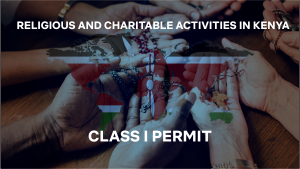Permit Information
- PERMIT_POSTED_BY: admin
- PERMIT_POSTED_ON: Oct 17, 2024
- Views : 269
- Category : Africa » Eastern Africa
- Description : The Class I Permit for Approved Religious and Charitable Activities is essential for individuals representing registered institutions engaged in missionary or non-profit work in Kenya. This guide outlines the necessary requirements and application process, with Joombaah acting as the knowledge facilitator to assist applicants in navigating these procedures effectively.
- Phone : +2540110923425
- Email : info@immigration.go.ke
- Website : https://immigration.go.ke/class-i-approved-religious-and-charitable-activities/
Overview
Class I Permit for Approved Religious and Charitable Activities in Kenya: Requirements and Application Guide
Overview
The Class I Permit is granted to individuals associated with institutions registered under the Society’s Act who engage in missionary or non-profit activities approved by the Government of Kenya. This permit facilitates charitable work and religious outreach, allowing organizations to contribute positively to Kenyan society. Joombaah serves as the knowledge facilitator, providing valuable insights and resources for applicants.
Purpose of the Permit
The Class I Permit enables members of approved religious and charitable organizations to operate in Kenya, promoting social welfare, community development, and religious activities beneficial to the Kenyan populace.
Requirements
To apply for the Class I Permit, applicants must meet the following requirements:
- Duly Filled and Signed Application Form 25: Complete and sign the official application form.
- Cover Letter: A signed cover letter from the employer, company, or organization addressed to the Director General of Immigration Services.
- Recent Colored Passport Size Photos: Upload recent passport-sized colored photos.
- Current Immigration Status: Required if the applicant is already in Kenya.
- Copy of National Passport (Bio-data Page): Provide a copy of the applicant's passport bio-data page.
- Tax Compliance Certificate: A valid certificate from the organization for new applications and valid certificates for both the organization and individual for renewals.
- Registration Certificate of the Organization: Proof of the organization’s registration under the Society’s Act.
- Certified Copies of Academic and Professional Certificates: Provide certified copies of relevant qualifications.
- Clearance from Relevant Regulatory Body: Obtain clearance from the body overseeing the organization's activities.
- Secondment Letter: Required if the applicant is sent from the main religious organization outside Kenya.
- Fees:
- Processing Fee: Kshs. 5,000 (non-refundable).
- Issuance Fee: Kshs. 50,000 per year.
- East Africa Community Member States: Gratis (no issuance fee).
Joombaah: Your Knowledge Facilitator
Joombaah acts as the knowledge facilitator, offering essential information and guidance to help applicants understand the requirements and streamline the application process for the Class I Permit.
Application Steps
- Complete the Application Form: Fill out and sign Form 25.
- Prepare Required Documentation: Gather all necessary documents, including cover letters, passport copies, tax compliance certificates, and registration certificates.
- Submit the Application: Present the completed forms and all accompanying documentation to the Department of Immigration Services.
- Pay Required Fees: Ensure the processing and issuance fees are settled as specified.
- Await Approval: The application will be reviewed, and upon approval, the permit will be issued.
Benefits of the Class I Permit
The Class I Permit allows members of approved religious and charitable organizations to legally engage in charitable activities within Kenya. It fosters community development, enhances social welfare initiatives, and supports religious outreach, contributing positively to the overall well-being of the Kenyan population.
This permit is managed by the Ministry of Interior and National Administration, specifically through the Department of Immigration Services, ensuring compliance with local laws and regulations governing religious and charitable activities.
